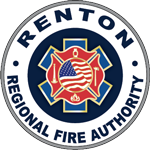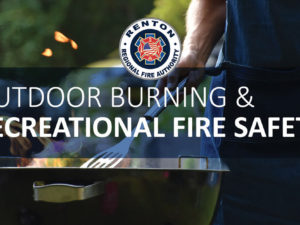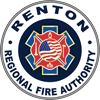Renton Fire is cooking up excitement for Fire Prevention Week and Month 2020, themed “Serve Up Fire Safety in the Kitchen!” beginning October 4-10.
The goal of Fire Prevention Week is to involve people, children and adults alike, to learn how to stay safe in case of a fire. Although we are unable to have guests visit the fire stations or come into the schools, we will be sharing a series of fire safety tips and videos throughout the month on how individuals and families can remain fire safe.
The National Fire Prevention Association has sponsored the public observance of Fire Prevention Week since 1922. In 1925 President Calvin Coolidge proclaimed Fire Prevention Week a national observance.
The events are held during the week of October 9 each year in commemoration of the Great Chicago Fire, which began on October 8, 1871, and caused devastating damage. This massive fire killed more than 250 people, left 100,000 people homeless, destroyed more than 17,400 structures, and burned more than 2,000 acres.
One of the things that makes cooking such a hazard is indeed the fire or hot surface itself. However, in many cases, it is human error, inattention being one of the root causes. It is important for families to learn and teach proper kitchen safety. Cooking is such a routine activity that it is easy to forget that the high temperatures used can easily start a fire. Often people become too sure and leave items unattended. Sometimes, especially during holidays, sporting events, or other activities, it can be easy to get distracted. For example, home fires caused by cooking peak during Thanksgiving and Christmas when people may be cooking more than usual but may also be distracted by visiting family members and friends. Always be attentive to what’s cooking and never leave any items on the stove or oven unattended.
Other Kitchen Safety Tips:
- Plug all kitchen appliances, including microwaves, toasters and coffee makers, directly into a wall outlet. Never use an extension cord as it can overheat and cause a fire.
- Use the right outlet for the right appliance. For larger appliances, such as ovens and refrigerators, be sure to only use properly grounded outlets with circuits that match the rating plate on the appliance. If you have older 2-prong outlets in other locations of your kitchen, have a qualified electrician replace it with a properly grounded 3-prong outlet. Do not use an adapter.
- Replace any power cords that become frayed or otherwise damaged. Never use a cord that shows cracks or other damage.
- When moving kitchen appliances, be aware of power cords. Rolling over or pinching power cords can damage them.
- Unplug small appliances when not in use.
- Keep your stove and oven clean. Built up food splatter or grease can later ignite when the stove or oven is turned on for cooking.
- Check and clean stove hoods and filters regularly. If your stove hood vents externally, make sure insects or birds do not build nests or otherwise impede air flow through it.
- Never use a gas or propane oven to heat your home. Not only is this a fire hazard, but it can also give off toxic gases.
What to Do If a Kitchen Fire Flares Up
- By exercising caution at all times in your kitchen, you can help reduce the risk of a kitchen fire. But if a fire does flare up, you need to be prepared.
- Your safety should always come first. If you are unsure about whether it is safe to fight the fire, leave the scene, call 911 for help, and let the fire department control the fire
- If a small fire flares up and you are going to attempt to extinguish it, call 911 for help first. A fire may grow out of control more quickly than you anticipate. It is safer to have help already on the way.
Let’s Serve Up Fire Safety!






